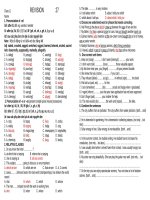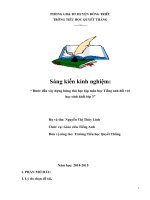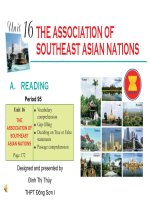Bài ôn tập môn học Tiếng Anh khối 11 - Unit 9 đến unit 16
Bạn đang xem bản rút gọn của tài liệu. Xem và tải ngay bản đầy đủ của tài liệu tại đây (1.09 MB, 10 trang )
<span class='text_page_counter'>(1)</span>A. READING 1. equip [i'kwip] with(v) trang bị →equipment [i'kwipmənt] (n) thiết bị, sự trang bị 2. advanced [əd'vɑ:nst](a) tiên tiến →advancement [əd'vɑ:nsmənt] (n) sự tiến bộ 3. spacious ['spei∫əs] (a) = roomy : rộng rãi →space ['speis] (n) không gian 4. well-trained (a) = skilled : lành nghề 5. staff (n): (toàn thể) nhân viên 6. thoughtful ['θɑ:tfl] (a) chín chắn, sâu sắc # thoughtless ['θɑ:tlis](a) không suy nghĩ 7. courteous ['kə:tjəs] (a) = polite : lịch sự →courtesy (n) lịch sự →courteously ['kə:tjəsli] (adv): một cách lịch sự 8. mail and parcel service (n) dịch vụ chuyển thư và bưu phẩm 9. surface mail ['sə:fis] (n) thư gởi bằng tàu ,xe 10. EMS (Express Mail Service): dịch vụ thư chuyển phát nhanh 11. weight limit ['weit] (n) trọng lượng giới hạn 12. Express Money Tranfer chuyển tiền nhanh 13. speedy ['spi:di] (a) = nhanh chóng ←speed (n) tốc độ 14. secure [si'kjuə] (a) bảo đảm, an ninh → security [si'kjuərəti](n) sự an ninh/ an toàn 15. transfer ['trænsfə] (v) chuyển (n) sự chuyển →transferance (n) sự chuyển đi →transferable [træns'fə:rəbl] (a) có thể chuyển đi 16. Messenger Call Service (n) dịch vụ điện thoại 17. notify ['noutifai] (v) thông báo → notification [,noutifi'kei∫n] (n) sự thông báo → notifiable (adj) phải khai báo 18. recipient (n) người nhận 19. shape (n) hình dạng shapeless (n) không hình dạng, dạng gốc 20. facsimile [fæk'simili] (n) = fax (n) bản sao , máy fax 21. transmission [trænz'mi∫n] (n) sự chuyền đi ← transmit (v) truyền đi 22. graphics (n) đồ họa, bức họa 23. press distribution [,distri'bju:∫n] (n) sự phát hành báo chí 24. subscribe (v) đăng kí (mua báo) → subscription (n) sự đăng ký → subscriber [səb'skraibə] (n) người đăng ký (thuê bao điện thoại, đặt mua báo dài hạn..) B. SPEAKING 1. install [in'stɑ:l] (v) → installation [,instə'lei∫n] (n) 2. take place (v)diễn ra, tiến hành 3. register ['redɑistə](v) đăng ký → registration [,redɑi'strei∫n] (n):. C. LISTENING 1. Commune ['kɑmju:n] (n): → communal ['kɑmjunl] (a): chung, công cộng 2. Rural ['ruərəl](a) : thuộc nông thôn 3. Digit ['didɑit] (n): con số 4. Capacity [kə'pæsiti](n): khả năng sản xuất, sức chứa 5. Upgrade [ɑp'greid] (v):cập nhật 6. Telecommunication [,telikə,mju:ni'kei∫n] (n) viễn thông 7. Reduce [ri'dju:s]: giảm (v) → reduction (n). Lop11.com.
<span class='text_page_counter'>(2)</span> subscribers. Unit 9 THE POST OFFICE – networks - upgrading - customer demand. -. rural areas. Over the past few years, Vietnam has quickly developed its telephone system. Vietnam ranks second only to China for growth in the number of telephone (1) ………………….. . It is among the 30 countries in the world that have more than two million telephone subscribers. In the early 1990s, there were only 140,000 telephones across Vietnam. At present, we have more than six million subscribers. In 1996, Vietnam began (2)………………….. its fixed telephone (3) ……………… and changing numbers from six to seven digits in Hanoi and Ho Chi Minh City as well as five to six digits in other provinces . Five years later, the mobile phone system was upgraded to meet the growth in (4) …………………………….. since 2000 , Vietnam has reduced the price of several services, especially in the monthly fees for fixed and mobile telephones . In the future, more attention will be paid to the (5) ………………………. At present, 93 percent of communes across Vietnam have telephone services .A network of 6,014 communal post offices have been set up across the country. D. WRITING 1. quality ['kwɑliti] (n): chất lượng 2. attitude ['ætitju:d] (n): thái độ 3. punctuality [,pɑηkt∫u'æləti] (n): sự đúng giờ → punctual ['pɑηkt∫uəl] (a): đúng giờ 4. arrogant ['ærəgənt] (a): kiêu ngạo 5. pickpocket ['pik,pɑkit] (n): kẻ móc túi 6. deliver [di'livə](v) → delivery [di'livəri] (n) 7. resident ['rezidənt](n): người dân. Record: Father & Son Ltd, good morning for Sales press one. For Account press two. For enquiries, please hold. Dona : Father & Son company , Thank you for __________ . This is Dona speaking. How can I help you? Georgia: Hello, my name is Georgia King, I’d like to speak to Jon Barnes, please. Dona : Sorry , what __________ is that ? Georgia: It’s Georgia King speaking. Dona: Oh, I’m afraid Mr. Barnes isn’t here at the moment. Can I take a __________? Georgia: Well, I’m returning his call. He left me a message to call him. Dona : Ok, Hold on please … The line’ s _____________ at the moment . Can you call Mr. Barnes back later? Georgia: Um, Can I leave a message please ? Dona: Oh, just a minutes. I’ll put you _________ to one of his colleagues.. Lop11.com.
<span class='text_page_counter'>(3)</span> A.READING 1. endangered [in'deindɑərd]( (a) bị nguy hiểm ← endanger [in'deindɑə(r)](v) gây nguy hiểm → endangerment (n) sự gây nguy hiểm 2. species ['spi:∫i:z] (n) chủng loài 3. cheetah ['t∫i:tə] (n) báo gấm 4. estimate ['estimit - 'estimeit] (v) ước tính → estimation (n) sự ước tính 5. panda ['pændə] (n) gấu trúc 6. influence ['influəns] (v,n) ảnh hưởng →influential [,influ'en∫əl] (a) có ảnh hưởng 7. pollute [pə'lu:t] (v) =contaminate : làm ô nhiễm → pollution (n) sự ô nhiễm → polluted (a) bị ô nhiễm → pollutant (n) chất gây ô nhiễm 8. respect (n) =aspect: phương diện, 9. result in (v) =cause : gây ra, đưa đến 10. consequence ['kɑ:nsikwəns] (n) =result (n): hậu quả 11. rare ['reə] (a) quý hiếm 12. as a result (prep) = therefore : do đó 13. extinct (a) tiệt chủng →extinction [iks'tiηk∫n] (n) 14. prohibit [prə'hibit] (v) ban, cấm → prohibition [,prouhi'bi∫n](n) sự cấm 15. interfere [,intə'fiə](v) can thiệp → interference [,intə'fiərəns](n) 16. survive [sə'vaiv] (v)sống còn, sống sót → survival [sə'vaivl](n) :sự sống còn 17. off – spring (n) con cháu , dòng dõi 18. co-exist (v) chung sống , cùng tồn tại → co-existence (n) 19. dinosaur [dainə's ɑ:r](n) khủng long 20. fur [fə:] (n) lông (mao) bộ lông 21. capture ['kæpt∫ər] (v) sự bắt giữ 22. recreate [,rekri'ei] (v) làm giải khuây → recreation [,rekri'ei∫n] (n) sự giải trí ,sự tiêu khiển → recreational [,rekri'ei∫ənl] (a)thuộc giải trí 23. cultivaion [,kɑlti'vei∫n] (n) sự canh tác ← cultivate ['kɑltiveit](v) trồng trọt → cultivated (adj) có trồng trọt 24. discharge [dis't∫a:] (n) sự tuôn ra / đổ ra 25. measure ['meɑə] (n)= action : hành động , biện pháp 26. discourage [dis'kɑridɑ] (v) làm nản chí # encourage (v) khích lệ 27. discouragement [dis'kɑridɑmənt] (n) 28. impact ['impækt] (n) = influence : tác động , ảnh hưởng 29. scenic feature ['si:nik 'fi:t∫ə] (n) đặc điểm cảnh vật 30. devastate ['devəsteit] (v) = destroy : tàn phá 31. devastation [,devəs'tei∫n] (n) = destruction(n) 32. approximately (a) nearly, almost : gần như 33. maintain [mein'tein] (v) bảo trì → maintainable [mein'teinəbl] (a) có thể bảo trì 34. maintenance ['meintinəns] (n) sự bảo trì 35. preserve [pri'zə:v] (v) gìn giữ / bảo tồn → preservation [,prevə'vei∫n] (n) → preservable [pri'zə:vəbl] (a) có thể bảo tồn 36. currently ['kɑrəntli] (adv) at the present time: 37. abundant [ə'bɑndənt] (a) = plenty : phong phú → abundancy (n) sự phong phú 38. snore [sn ɑ:] (v) ngáy (ngủ) Lop11.com.
<span class='text_page_counter'>(4)</span> 39. grateful ['greitful] (a) biết ơn 40. owe (v) nợ 41. be blamed for (v) đáng khiển trách. →gratitude ['grætitju:d] (n) lòng biết ơn. C. LISTENING preserve –. Unit 10 in danger of. NATURE IN DANGER C . LISTENING - approximately – completely - devastating. In many parts of the United States , large areas of land have been made into national parks to protect and (1) …………………. the natural beauty of the land . National parks usually contain a variety of scenic features, such as mountain, cakes, lakes, rare animals and plants. Today, there are 52 national parks in the United States, covering (2) ……………….. …. 3 per cent of the total land area of the country. National parks are all open to the public and have millions of visitors each year. Many national parks, however, are (3)……………………being destroyed. Rare animals in national parks are killed or hunted for fur, skin or other parts. Trees are cut down for wood. Large areas of national parks also experience (4) ………………… fires caused by careless people . The increasing number of visitors is harming the parks due to the pollution from their vehicles. If these problems are not solved immediately , and if there is not enough money for the parks’ staff and maintenance of their resources , many national parks will be (5) ………………. destroyed .. A. READING 1. 2. 3. 4. 5. 6. 7. 8. 9. 10. 11. 12. 13. 14. 15. 16. 17. 18. 19. 20. 21. 22. 23.. alternative [ɑ:l'tə:nətiv] (a) thay thế available [ə'veiləbl] (a) sẵn có dam (n) đập (ngăn nước) electricity [i,lek'trisiti] (n) điện energy ['enədɑi] (n) năng lượng exhausted [ig'z ɑ:stid] (a) cạn kiệt fossil fuel ['f ɑ sl fjuəl] (n) nhiên liệu hóa thạch geothermal heat [,dɑi:ou'θə:məl hi:t] (n) địa nhiệt infinite ['infinit] (a) vô hạn make use of (exp) tận dụng nuclear energy ['nju:kliə] (a) năng lượng hạt nhân plentiful ['plentifl] (a) nhiều power demand (n) nhu cầu sử dụng điện release [ri'li:s] (v) phóng ra reserve [ri'zə:v] (n) trữ lượng solar energy ['soulə] (n) năng ượng mặt trời solar panel ['pænl] (n) tấm thu năng lượng mặt trời windmill ['winmil] (n) cối xay gió convenient [kən'vi:njənt] (a) tiện lợi enormous [i'n ɑ:məs] (a) to lớn, khổng lồ harmful ['h ɑ:mful] (a) có hại hydroelectricity [,haidrouilek'trisiti] (n) thủy điện nuclear reactor [ri:'æktə] (n) phản ứng hạt nhân Lop11.com.
<span class='text_page_counter'>(5)</span> 24. 25. 26. 27. 28. 29. 30. 31. 32. 33. 34. 35. 36. 37. 38.. radiation [,reidi'ei∫n] (n) phóng xạ renewable [ri'nju:əbl] (a) có thể thay thế run out (v) cạn kiệt ecologist [i'k ɑlədɑist] (n) nhà sinh thái học ecology (n) sinh thái học fertilize ['fə:tilaiz] (v) bón phân replace [ri'pleis] (v) thay thế consumption [kən'sɑmp∫n] (n) sự tiêu thụ make up (v) chiếm (số lượng) conduct ['k ɑndɑkt] (v) tiến hành experiment [iks'periment] (n) cuộc thí nghiệm extraordinary [iks'trɑ:dnri] (a) lạ thường locate [lou'keit] (v) nằm ở → location (n) vị trí progress ['prougres] (n) sự tiến triển surround [sə'raund] (v) bao quanh. C. LISTENING Unit 11 SOURCES OF ENERGY . renewable – Ecologists - fertilized – unlimited – supply - nonrenewable - correct amount The natural environment includes all natural resources that are necessary for life the air, the oceans, the sun, and the land. Because they are vital for life, these resources must be protected from pollution and conserved. (1) …………….. study their importance and how to use them carefully. According to ecologists, resources are divided into two groups: (2) ………………….. and nonrenewable .When a resource is used , it takes some time to replace it . If the resources can be replaced quickly, it is called renewable. If it cannot be replaced quickly and easily, it is nonrenewable. For example, grass for animals is a renewable resource. When cows eat the grass, the resource is used. If the soil is (3) ……………… and protected, more grass will grow. Coal, However, is (4) ………………… because it takes millions of years to make coal. All fossil fuels are nonrenewable resources. Solar energy, air and water are renewable resources because there is an (5) ……………….. (6) …………………….However, this definition may change if people are not careful with these resources. The amount of solar energy that reaches the Earth depends on the atmoshere. If the atmosphere is polluted, the solar energy that reaches the earth may be dangerous. If life is going to continue, the air must contain the (7) ………………. of nitrogen (N), oxygen (O), carbon dioxide (CO2) and other gases. If humans continue to pollute the air, it will not contain the correct amounts of these gases.. Water is very necessary to people and other living things. Without water, people, animals and plants cannot live. And if there were no plants, water would run off after it rains, and this would cause a lot of floods. But nature has many ways of conserving and controlling water. Water can be held on the land by planting vegetation. Forests and grass should be planted where there are no natural growths. Dams built across rivers help hold back the water. Reservoirs behind the dams store water during wet seasons for use in dry seasons. Dams help prevent floods by controlling the flow of water. Lop11.com.
<span class='text_page_counter'>(6)</span> 1. advance [əd'vɑ:ns] (v) tiến bộ 2. appreciate [ə'pri:∫ieit] (v) đánh giá cao 3. aquatic sports [ə'kwætik spɑ:t] (n) các môn thể thao dưới nước 4. athletics [æθ'letik] (n) điền kinh 5. billiards ['biljədz] (n) 6. bodybuilding (n) thể dục thể hình 7. cycling ['saikliη] (n) đua xe đạp 8. decade ['dekeid] (n) thập kỷ 9. enthusiasm [in'θju:ziæzm] (n) sự hăng hái, nhiệt tình 10. facility [fə'siliti] (n) tiện nghi 11. fencing ['fensiη] (n) đấu kiếm 12. hockey ['hɑki] (n) khúc côn cầu 13. host country (n) nước chủ nhà 14. intercultural knowledge [,intə 'kɑlt∫ərəl] (n) kiến thức liên văn hóa 15. mountain biking (n) đua xe đạp địa hình 16. purpose ['pə:pəs] (n) mục đích 17. rugby ['rɑgbi] (n) môn bóng bầu dục 18. shooting ['∫u:tiη] (n) bắn súng 19. solidarity [,sɑli'dærəti] (n) tình đoàn kết 20. squash [skwɑ∫] (n) môn bóng quần 21. weightlifting ['weit liftiη] (n) cử tạ 22. wrestling ['resliη] (n) đấu vật 23. karatedo [kə'rɑ:tidou] (n) võ karatê 24. freestyle ['fri:stail] (n) kiểu bơi tự do 25. gymnasium [dɑim'neizjəm] (n) phòng thể dục dụng cụ 26. gymnast ['dɑimnæst] (n) vận động viên thể dục 27. gymnastics [,dɑim'næstiks] (n) môn thể dục dụng cụ 28. high jump (n) nhảy cao 29. long jump (n) nhảy xa 30. record ['rekɑ:d] (n) kỷ lục 31. promote [prə'mout] (v) quảng bá 32. recruit (v) tuyển 33. upgrade [ɑp'greid] (v) nâng cấp 34. widen ['waidn] (v) mở rộng → wide (a) rộng 35. book (v) mua vé trước C .LISTENING Unit 12 THE ASIAN GAMES freestyle – Gymnasium - gold medal - competed -. coming from –. Good evening, It’s 10:15 and it’s time for “The Asian Games Report”. It’s the 3rd days of the Games Well, today’s most important event was the women’s 200 metre (1)……………… . The Japanese, Yuko was first and got the (2)……………….. . She made a new world record time of 1 minute 58 Lop11.com.
<span class='text_page_counter'>(7)</span> seconds. The Japanese athletes won two gold medals yesterday, and three the day before, so in the first three days they’ve won six gold medals. Here we’re in the (3)………………. . LiLy, the Chinese gymnast, has just finished her display. She’s got an average of 9.5 points. That’s the best score today! Lily’s won the gold medal. And this is Lee Bong Ju coming from Korea. This is the second time he (4) ……………. in the long jump at the Asia games. Last time he jumped 8.5 metres .Today he’s won a gold medal for men’s long jump. He jumped 8.9 metres. … Now we’re waiting for the last high jumper, Vichai (5) ………….. Thailand. The bar is at 2.30 metres and …. It seems too high for him. Vichai has just jumped! … Ooh, He’s crashed into the bar. He’s landing. The bar has fallen too. He’s getting up and walking away. But he’s very disappointed. A.READING 1. accompany [ə'kɑmpəni] (v): đệm đàn 2. accomplished (a) [ə'kɑmpli∫t]: có tài, cừ khôi 3. admire (v) [əd'maiə]: ngưỡng mộ 4. avid (a) ['ævid]: khao khát, thèm thuồng 5. collect (v) [kə'lekt]: sưu tập → collection (n) [kə'lek∫n]: bộ sưu tập →collector (n): người sưu tập 6. discard (v) [di,skɑ:d]: vứt bỏ 7. fish tank (n): bể cá 8. indulge IN (v) [in'dɑldɑ]: say mê 9. modest (a) ['mɑdist]: khiêm tốn 10. occupied (a) ['ɑkjɑpaied]: bận rộn 11. tune (n) [tju:n]: giai điệu 12. broaden (v) ['brɑ:dn]: mở rộng (kiến thức) → broad (a) rộng 13. category (n) ['kætigəri]: loại, hạng, nhóm 14. classify (v) ['klæsifai]: phân loại 15. name tag (n): nhãn ghi tên 16. bygone (a) ['baigɑn]: quá khứ, qua rồi 17. cope WITH (v): đối phó, đương đầu 18. fairy tale (n) ['feəri teil]: chuyện cổ tích 19. gigantic (a) [dɑai'gæntik]: khổng lồ 20. ignorantly (adv) ['ignərəntli]: ngu dốt, dốt nát 21. profitably (adv) ['prɑfittəbli]: có ích C. LISTENING Unit 13 HOBBIES My Hobby interesting – human achievements - wanted – disease - better equipped My hobby is reading. I read story books, magazines, newspapers and any kind of material that I find (1) ……………….. . My hobby got started when I was a little boy. I had always (2) ………………. my parents to read fairy tales and other stories to me. Soon they got fed up with having to read to me continually. So as soon as I could, I learned to read. I started with simple ABC books. Soon I could read simple fairy tales and stories. Now I read just about anything that is available.. Lop11.com.
<span class='text_page_counter'>(8)</span> Reading enables me to learn about so many things. I learned about how people lived in bygone days. I learned about the wonders of the world, space travel , (3) ……………………… , gigantic whales, tiny viruses and other fascinating things . The wonderful thing about reading is that I do not have to learn things the very hard way. For example, I do not have to catch a (4) …………………… to know that it can kill me. I know the danger so I can avoid it. Also I do not have to go deep into the jungle to find out about tigers. I can read all about it in a book. Books provide the reader with so many facts and so much information. They have certainly helped me in my daily life. I am (5) ………………………. to cope with living. Otherwise, I would go about ignorantly learning things the hard way. So I continue to read. Reading is indeed a good hobby.. Television is one of man’s most important means of communication. It brings pictures and sounds from around the world into millions of homes. A person with a television set can sit in his house, and he can watch the present make a speech or visit a foreign country. He can see a war happening and watch statesmen try to bring about peace. Through television, home viewers can see and learn about people, places and things in far-away lands. Television also provides more entertainment programmes than any other kind. The programmes include plays or dramas, light comedies, sporting events and motion pictures, so television now plays an important role in many people’s lives. It is more convenient as well as cheaper for people to sit comfortably at home than to go out.. A. READING 1. lift off (v): phóng lên 2. approximately [ə'prɑksimitli] (adv): khoảng chừng (about) 3. orbit ['ɑ:bit] (n): quỹ đạo 4. speed (n) tốc độ 5. cosmonaut ['kɑzmənɑ:t] (n) = astronaut ['æstrənɑ:t] (n): phi hành gia, nhà du hành vũ trụ 6. weightlessness (n) : tình trạng không trọng lượng 7. enormous [i'nɑ:məs] (a) to lớn, khổng lồ 8. uncertainty [ɑn'sə:tnti] (n): sự không chắc chắn → uncertain (a) 9. precisely (adv) : một cách chính xác ← preciseness (n) [pri'saisnis]: 10. react (v) phản ứng lại 11. extreme [iks'tri:m] (a): vô cùng, tộ bậc → extremely (adv) 12. temperature ['temprət∫ə] (n): nhiệt độ 13. psychology [sai'kɑlədɑi] (n): tâm lý → psychological [,saikə'lɑdɑikl] (a) : thuộc về tâm lý 14. tension ['ten∫n] (n): sự căng thẳng 15. technical failure ['teknikl] ['feiljə] (n): sự cố kỹ thuật 16. hero ['hiərou] (n): người anh hung 17. venture ['vent∫ə] (n) : việc mạo hiểm 18. feat [fi:st] (n): chiến công, kỳ công 19. tragic ['trædɑik] (a): bi thảm, bi kịch 20. occurr (v) xảy ra → occurrence (n) [ə'kɑrəns] 21. routine [ru:'ti:n] (a) thường lệ Lop11.com.
<span class='text_page_counter'>(9)</span> 22. raise [reiz] (v) nêu lên 23. spacecraft ['speis'krɑ:ft] (n) tàu vũ trụ = spaceship (n) 24. honour ['ɑnə] (v) : ca ngợi C. LISTENING challenged. Unit 15 – astronauts. -. SPACE CONQUEST. collected soil. -. launched –. efforts. In a speech to the Congress in 1961, the US President Kennedy (1) ……………… the nation to put a man on the moon before the end of the decade. After the president’s speech, NASA’s Apollo programme was developed to meet the challenge. Only July 16, 1969, the Apollo 11 was (2) …………….. . The astronauts on board of the spacecraft were Neil Armstrong, Buzz Aldrin and Michael Collins. On July 20, 1969, Neil Armstrong became the first man on the moon. He was followed by Aldrin 40 minutes later. To walk on the moon’s surface, the (3) ……………….. needed to wear a spacesuit with a portable life support system. This controlled the oxygen, temperature and pressure inside the spacesuit. Armstrong and Aldrin spend a total of two and a half hours on the moon’s surface. They performed a variety of experiments and (4) ………………….. and rock samples to return to Earth. An American flag was left on the moon’s surface as a reminder of the achievement. The crew of Apollo 11 returned to Earth on July 24, 1969. They successfully completed their historic mission. It is regarded as one of the greatest human (5) ………………. in the history of mankind.. A. READING 1. pharaoh ['feərou] (n): Vua Ai Cập cổ 2. tomb [tu:m] (n): ngôi mộ 3. transport ['trænspɑ:t](v): vận chuyển 4. treasure ['treɑə] (n): kho báu 5. base [beis] (n): nền móng 6. burial ['beriəl] (n): sự mai tang ← bury (v) mai táng, chon 7. chamber (n): buồng, phòng 8. circumstance ['sə:kəmstəns] (n): tình huống 9. construction [kən'strɑk∫n] (n): công trình; sự xây dựng ← construct (v) 10. proceed [prə'si:d] (v): tiến hành 11. theory ['θiəri] (n) lý thuyết: giả thuyết 12. propose [prə'pouz](v): đề xuất, đưa ra 13. enclose [in'klouz] (v): dựng tường, rào (xung quanh cái gì) 14. mandarin ['mændərin] (n): vị quan 15. man-made (a): nhân tạo 16. mysterious [mis'tiəriəs] (a): huyền bí, bí ẩn 17. pyramid ['pirəmid] (n): kim tự tháp 18. spiral ['spaiərəl](a): hình xoắn ốc 19. surpass [sə:'pɑ:s] (v): vượt qua, trội hơn 21. wonder (n): kỳ quan Lop11.com.
<span class='text_page_counter'>(10)</span> C. LISTENING considered –. Unit 16 : THE WONDERS OF THE WORLD THE GREAT WALL OF CHINA purposes - stretches - magnificence - prefer to -. excitement. The Great Wall of China, which is said to be visible from the moon, winds up and down across deserts, grasslands and mountains of 5 provinces. It is (1) …………….. one of the greatest manmade wonders in the world thanks to its (2) ………………. and significance . In 1987, the Great Wall was listed as a World Heriatge by UNESCO. The Great Wall as we see today was mostly built during the Ming Dynasty for defence (3) ……………… It started in 1368 and took 200 years to complete. Some parts of the wall are much older and go back to around 200 B.C. It (4) …………….. for about 6,000 km from east to west .The wall is about 11 metres high and a stone roadway runs along the top of it . The Great wall is a symbol of the Chinese nation throughout history. If you (5) ………………. see the wall in a relatively natural state, you’d better go to the northwest of Beijing. This part of the wall is the best choice for it is still in its original state. A visit to the Great Wall will certainly bring tourists great (6) …………………in each step of the wall.. On 4th October, 1957 Moscow radio broadcast the news of the tremendous _______________, the former Soviet Union lauched the world’s first artificial satellite.The Russian word “sputnik”in one day became an ______________ word. Since that time, the former Soviet Union has __________ many other heavier sputniks and rockets to trail the path of man to the planets and the ________. The whole world was waiting for the first manned space flight. Few people doubted that it would happen in the former Soviet Union. Nevertheless, the actual ________ came as a complete surprise. On 12th April 1961 a Soviet pilot, Yuri Gagarin, took mankind’s first step into _______. This historical event has proved that man reach out and touch the distant stars and _________ the secrets of the univers ….. Lop11.com.
<span class='text_page_counter'>(11)</span>









